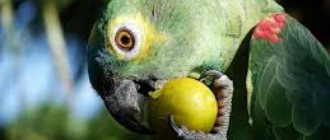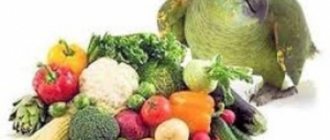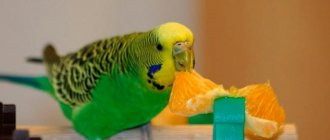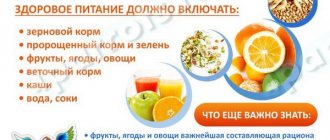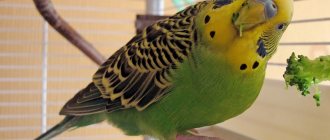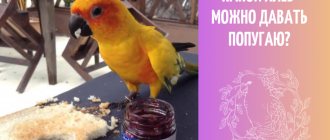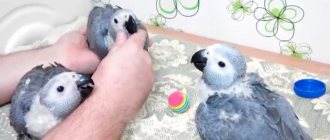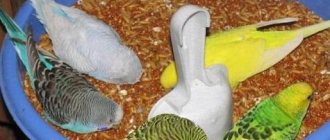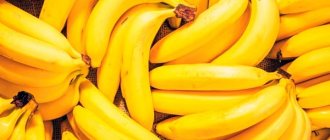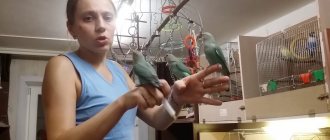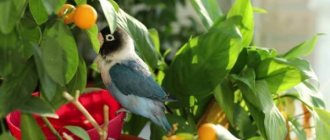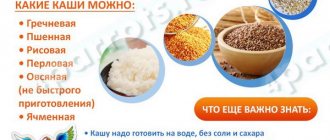Many people often think about whether it is possible to give a parrot seeds or whether it is still worth protecting the bird from such a food product.
Perhaps you are also interested in this question, because otherwise this article would not be so interesting to you.
We can say for sure that you can give seeds to your parrot, since they contain a large amount of useful elements and nutrients, but you should understand that not all seeds are useful for parrots, since some can harm them.
Of course, we are talking about fried seeds, which are strictly prohibited from being included in the diet.
Now let’s look at the seeds that can be given to a parrot without worrying about possible adverse consequences for its body.
- Why is it forbidden to give fried seeds to a parrot?
- What seeds are good for a parrot?
Are seeds allowed for birds?
First of all, you should clarify the condition of the product. Roasted seeds of any kind are strictly contraindicated for parrots . Not only does the product lose a good half of its beneficial qualities during heat treatment, but it also acquires a lot of toxic substances. They not only disrupt the functioning of the gastrointestinal tract, but can lead to the death of the pet in difficult cases.
Therefore, seeds should be given only raw. You should also take into account the characteristics of the subspecies of the bird and its taste preferences.
Some parrots outright refuse the offered treat, while others gladly accept the treat. In this case, it makes sense to consult a bird breeder or veterinarian.
Can parrots have walnuts?
The diet of parrots usually depends on their breed and size. Large birds require more food. One of the most high-calorie foods in the diet of these birds are nuts. They become an important source of lipids, but they only need to be given in small quantities.
In nature, parrots eat mainly green nuts, so it is advisable to choose those that can be stored for about 3 months.
Since walnuts are the most common in Russia, owners of parrots of different breeds often have a question about whether these birds can be given such nuts, and, if so, how much of the product is allowed. These fruits are large in size. Therefore, they must be given taking into account the breed of the bird.
Large individuals can have 3-4 fruits per day, while small wavy ones need no more than a quarter of one.
Moreover, even if the former are able to crack the shell on their own with a strong beak, the latter need to crack it. Nuts should be given exclusively in peeled form and broken into small pieces.
What types
The most common plants in the Russian Federation are sunflowers and pumpkins. The seeds of the crops contain many substances beneficial to the bird’s body and are available almost all year round. They are less likely to become a catalyst for the development of allergic reactions, unlike sesame or flax.
Sunflower
The product contains a large amount of vitamins A, E and B. Due to the presence of fats, the elements are quickly absorbed by the intestines. Sunflower seeds are rich in fluorine, magnesium, calcium and other minerals beneficial to birds.
The first sunflowers appeared in Russia thanks to Peter I. The Tsar brought them from Holland, but for almost two centuries the plant served only a decorative role. Whereas today Russia ranks first in the production of sunflower seeds.
The set of minerals has a positive effect on the cardiovascular system, increasing the elasticity of the walls and stabilizing blood pressure. Carbohydrates help replenish the lack of energy, which is especially important if the pet has suffered a serious illness.
The vitamins and minerals contained in sunflower have a positive effect on the skin and feathers of the animal. It is important to give seeds during the period of molting and reproduction. But the dosage of the product should be strictly monitored.
The main disadvantage of seeds is their high calorie content. One or two extra doses and the bird will begin to develop obesity, which is very long and difficult to treat. It has been noticed that wild seeds accumulate heavy metals, which is also harmful to birds.
It is possible to exceed the daily norm of seeds only in cases where the bird needs to gain weight, for example, after a long illness or prolonged fasting.
Pumpkin
The product contains large amounts of:
- zinc;
- calcium.
The elements contribute to the restoration and formation of bone tissue.
Manganese, phosphorus, copper and iron accelerate cell regeneration , improve vision and the condition of the feather cover.
Pumpkin seeds can act as a prophylactic for kidney and gastrointestinal diseases. But again, it is very important to follow the daily norm, otherwise the pet will quickly gain excess weight, because this is a high-calorie product.
One of the main properties of pumpkin seeds is the prevention of parasites. The product has been used as an anthelmintic for decades. If you have other pets in the house, such as cats or dogs, with access to the outdoors, then consuming pumpkin seeds will significantly reduce the risk of infestation for your parrot.
In addition to the high calorie content and the consequences of obesity, the product in some cases can cause stomach problems. If the bird has increased acidity or other gastrointestinal diseases, then it is better to abandon pumpkin seeds in favor of sunflowers.
The first mention of pumpkin appeared more than 3000 years ago. Mexico is considered the birthplace of the culture. Pumpkin is so picky about climatic conditions that it can grow almost anywhere, with the exception of the north and south poles.
Is it possible to have raw seeds?
At the same time, raw seeds are a natural, natural product that not only can, but also should be introduced into the food of parrots. Most types of food produced for them on an industrial scale contain a fine fraction obtained after processing sunflower and pumpkin seeds.
Moreover: raw seeds are not only edible, but also beneficial for the bird's body. However, compliance with the measure and reasonable dosage are important here.
Sunflower
Sunflower seeds have a high content of various mineral and vitamin compounds that will benefit your pet. However, due to their high percentage of fatty acids, they are difficult to digest foods.
Based on this, you need to carefully approach the calculation of the number of raw seeds that can be given to a parrot at a time. This problem was solved by manufacturers of special feeds, which took into account the optimal balance and ratio of all necessary ingredients, including sunflower seeds.
Such foods help improve digestive processes, digest food and facilitate the process of removing unnecessary elements from the body.
Important! Sunflower kernels are a source of vitamin E, which is a potent antioxidant and plays a key role in ensuring the health of all mucous membranes and skin. It is vitamin E that promotes the regeneration of body tissues and increases the protection of cell membranes.
In their pure form, sunflower seeds can only be given as a treat, 1-2 pieces per day.
Pumpkin
In dosed and standardized quantities, they will also be beneficial for the health of your feathered pet.
Raw pumpkin seeds:
- have a beneficial effect on the digestive system and metabolic processes;
- participate in the synthesis of important amino acids;
- tone and strengthen the body as a whole;
- help strengthen immunity and much more.
For a balanced introduction of pumpkin seeds into the bird's diet, special foods that can be found in pet stores are best suited. Manufacturers have compiled an optimal formula for a balanced feed, which indicates the required quantities of certain ingredients, including raw pumpkin seeds.
Important! Pumpkin kernels contain 12 essential and 8 nonessential amino acids necessary to ensure the normal functioning of the bird's body. And 100 grams of pumpkin seeds contain the daily requirement of all 20 amino acids.
In what form is it best to give?
The best option is bare grains. The husk may contain substances harmful to the bird's body, including infections. Even bare seeds should be rinsed with warm water before serving. When storing the product, high humidity should be avoided, otherwise there is a risk of fungus developing.
As such, neither pumpkin nor sunflower seeds need any processing . Disinfection with special lamps or chemicals will destroy useful elements. It is more advisable to purchase seeds for your pet at a pet store: they are already shelled and checked for pests.
What else should you not feed your parrot?
As it turned out, you should be careful when feeding your parrot seeds, but do not forget about other food products that are not suitable for feeding your pet.
Under no circumstances should you include the following foods in your parrot's diet:
- Bread (this product can cause clogging of the pet’s goiter).
- Salt.
- Sugar.
- Heat-treated, especially fried foods.
- Sausage products, including sausages, ham and others.
- Alcoholic and alcohol-containing drinks or products.
- Human food, including soups, vegetable dishes. Most of these products contain salt or excess fat.
- Fatty foods including fish oil and nuts.
- Mango, persimmon and papaya.
- Potatoes.
- Greens and spices.
- Dairy products, with the exception of low-fat.
Any pet requires from the owner not only affection and good attitude, but also careful care, in particular, care about the diet. In order to maintain the health and full strength of your pet, you should follow the rules of feeding it, avoiding particularly dangerous foods.
What else should you not feed your parrot?
Almost all products of the daily human diet are unacceptable for parrots - such food will certainly be harmful to your feathered pet.
Low-fat cottage cheese and hard-boiled chicken eggs can be considered exceptions to the rules. But even these two products should be introduced into the diet gradually and in very small doses.
- bread, especially black bread (it will cause your pet’s crop to become clogged);
- salt;
- sugar;
- any fried products;
- sausage;
- beer and other alcoholic drinks;
- fish;
- meat (any type and any method of preparation);
- boiled vegetables from your table (as they contain salts and fats);
- fish fat;
- nuts (too fatty);
- mango (toxic to parrots);
- potato;
- persimmon;
- papaya;
- parsley and other herbs;
- dairy products (cheese, yogurt, kefir, butter, cream, sour cream), except low-fat or low-fat cottage cheese.
It should also be taken into account that human saliva contains microorganisms that are dangerous to parrots.
When you have a feathered pet in your home, you should take an extremely responsible approach to the issues of its nutrition and health. You should not experiment with adding human food to your bird's diet.
The best food for parrots is special balanced food sold in pet stores. With the right nutrition, your pet will feel great, energetic and cheerful, so his stay in your home will bring joy to both you and the bird itself.
What not to give to a parrot: video
Grain feed
As the main “dish”, parrots can be offered ready-made food containing the necessary vitamin and mineral complexes. As a rule, they include a mixture of various grain crops, the bulk of which is millet and oats; and sunflower seeds, flax seeds, hemp seeds, and canary seeds can be used as additives. The finished food may also contain various seeds of wild herbs, and even pieces of dried fruit.
You can give budgies unroasted pumpkin and sunflower seeds, but in limited quantities, since sunflower seeds have a high content of vegetable fats.
No matter how nutritious grain food is, it is still not able to provide the pet’s body with everything it needs. For health, a full life, and just for pleasure, food for budgies should be more varied.
Vegetable menu for parrots
Before offering vegetables to your budgie, they must be washed very thoroughly. If there is a suspicion that the nitrate content is too high, vegetables can be soaked in water for two hours - the nitrates dissolve and are mostly eliminated. Birds prefer vegetables to be grated or finely chopped.
The following crops are extremely contraindicated for budgies: eggplant; radish, daikon, radish; celery; garlic, onion.
All other vegetables for birds are considered healthy, but some nuances must be taken into account:
Beans, green peas, and corn can be offered to pets only in season and only in a slightly unripe form. If the beans are fully ripe, they accumulate substances that are difficult for birds to digest, which can only be removed through prolonged cooking. Green salad and spinach are fed in very moderate portions to avoid digestive upset. The tomato must be completely ripe. The green areas of the fruit must be cut out, since the alkaloid solanine it contains is harmful to birds. Under no circumstances should you offer your pet tomato leaves.
Chinese cabbage accumulates nitrates in its hard petioles, so it is advisable to feed birds only the green part of the leaf. White cabbage. There is still no clear answer to the question whether cabbage can be given to budgies. Some birds readily eat it without any side effects, and some experience indigestion. In any case, it is recommended to first rinse the cabbage leaf with boiling water. Carrots are considered the most valuable food. It is offered in grated form mixed with other ingredients, for example, a boiled egg. Cucumber is capable of accumulating nitrates, so it is better not to feed purchased products to the parrot.
The following types of vegetable crops will also be very useful for budgies: pumpkin, melon, watermelon, turnip, squash, zucchini, beets, bell pepper.
